As we remember Jimmy Carter, the 39th president of the United States, who recently passed away at the age of 98, it becomes evident that the challenges he faced during his presidency closely align with those confronting current President Joe Biden. Despite a gap of forty-four years since Carter left office, the political landscape of America in 2024 exhibits troubling similarities to the economic, diplomatic, and environmental tumult of the late 1970s.
During Carter's administration, American citizens battled a crisis of confidence marked by economic instability and uncertain foreign relations. Fast forward to today, and the echoes of those challenges remain strong among the American populace. Common themes include struggles with the economy, environmental calamities, and persistent geopolitical tensions involving Russia, Afghanistan, and the Middle East.
Carter's notable achievement—brokering the Camp David Accords between Egypt and Israel—was overshadowed by the subsequent Iranian hostage crisis, illustrating the limitations of U.S. diplomatic power. This sense of helplessness resonated deeply, contributing to his significant electoral defeat by Ronald Reagan in 1980, mere hours before the release of the American hostages that had dominated his final year in office.
Current President Biden has faced comparable challenges, notably marked by the chaotic withdrawal from Afghanistan in 2021, which drew significant criticism and disappointment as the Taliban reclaimed power. Recent foreign exploits, such as the devastating conflict following Hamas's attacks on Israel, have similarly revealed the limited capacity of American leadership in marshaling international responses.
Both Carter and Biden have faced scrutiny over their responses to aggressive regional powers. Carter drew criticism for his handling of the Soviet Union's invasion of Afghanistan, responding with a controversial Olympic boycott in 1980. Biden, on the other hand, has notably garnered bipartisan support for military aid to Ukraine amid its struggles against Russian invasion, yet ongoing conflict continues to test U.S. resolve abroad.
The implications of past decisions still resonate today, particularly in the Middle East, where Carter's diplomatic work has largely failed to resolve the Israeli-Palestinian conflict. With rising tensions and recent hostilities escalating into broader regional confrontations, Biden's administration is similarly struggling to navigate this complex landscape.
Carter’s focus on environmental policies laid crucial groundwork for contemporary efforts heading into an era increasingly focused on climate change. Many of the strategies he championed—such as conservation and the promotion of renewable energy—found their way into Biden’s legislative endeavors, despite their roots in previous economic crises, like the oil embargo of Carter's presidency.
Notably reflective of the times, both leaders grappled with a significant public distrust in government. Carter famously articulated a "crisis of confidence" in 1979. In today's political climate, this distrust persists, with citizens increasingly skeptical of government efficacy—a trend that Biden has struggled to rectify during his tenure, further polarizing political perspectives.
As the dialogue around presidential legacies continues, comparisons between Jimmy Carter and Joe Biden emerge, notably through the lens of Donald Trump's critiques, which draw parallels between their governance amid adversity.
In contrast to Trump's political circus following his presidency, Carter embraced humility after leaving office, actively contributing to humanitarian causes and winning the Nobel Peace Prize for his lifelong advocacy. This distinction highlights a profound difference in post-presidential pursuits, as Carter sought to leave a positive imprint on the world, while Trump's focus appears fixated on political dominance.
In conclusion, the narratives of both Carter and Biden reflect an enduring cycle of resilience amid persistent challenges. As we honor Carter's legacy, it is essential to recognize the historical patterns that define American leadership and the enduring questions regarding power, trust, and the complexity of governance.



















